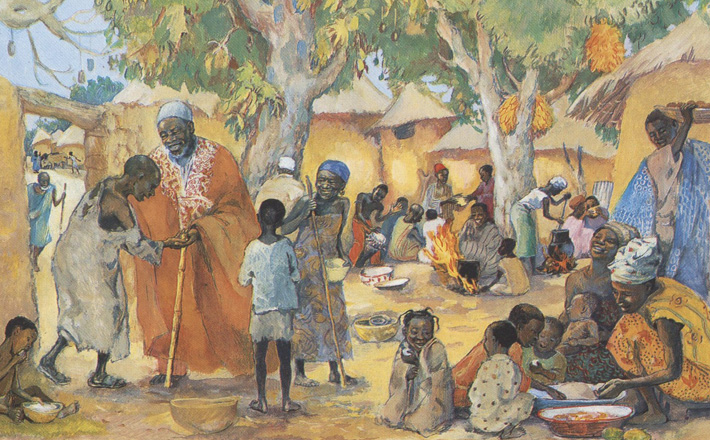Commentary on Luke 14:1, 7-14
Outwardly, the pericope for this Sunday seems to be offering just wise advice.
Do X and you will profit. It would be simple to read the text as good table manners for living wisely.
Luke, however, gives us some reasons to believe that he does not want us to read the text quite in this way. We begin with the setting. In Luke 14:1 we learn that the teaching in our text is given in the context of a Sabbath meal in the home of a Pharisee. The fact that they were “watching him closely” sounds odd, but makes more sense in light of their suspicion of Jesus earlier in the Lukan narrative (6:7, 11:53-54) and the fact that this text takes place in the context of Jesus’ long cruciform journey to Jerusalem beginning with 9:51. The cross casts its shadow even here.
When we press deeper into the text, however, we discover even more. It is true that the advice Jesus gives about choosing a low place in the hope of being (publicly) directed to a more favorable one sounds pretty shrewd. This point does not require theological insight, but does presuppose some social savvy. But lurking behind the mundane, everyday choices made at a public banquet is perhaps something of a more theological nature. When Jesus notices the guests at the Pharisee’s house choosing “places,” Jesus tells his hearers a parable (Luke 14:7). As fascinating as Lukan parables are (the Good Samaritan or the Prodigal Son), this particular one in 14:8-10 seems rather every-day and not extraordinary at all. We might even expect that most of what passes for parables are third-person stories with plots and characters. This “parable” in Luke 14:8-10, by contrast, is told in the second-person singular and in a way that seems designed to help you as reader recognize the typical and the ordinary. Of course, we do not have to hold Jesus or Luke the narrator responsible for twenty-first century parable theory. At the same time, Luke 14:7-11 does stick out relative to the other parables in Luke. Two features condition the way we should read Jesus’ “parabolic” advice. First, the language of parable typically frames a story which helps us understand God’s reign. While it is hard to see that explicitly here, the “typical” and the ordinary, even if the figure of the wedding banquet is used, is supposed to invite “you” to see more deeply. This is confirmed all the more with the closing verse of the unit, 14:11. Here we have migrated fully away from good advice about table manners to explicit theological language: “For all who exalt themselves will be humbled, and those who humble themselves will be exalted.” The use of the future tense and the divine passive suddenly place the prudential advice of 14:8-10 within a decidedly theological and perhaps even specifically eschatological frame of reference. In our table manners we may see poking through not just our real selves revealed for what we are, but God’s true table purposes. We may be thinking short term; God views it all within the arc of the divine long-term perspective of eschatology, which includes divine judgment, too. Imagine that: what starts off secular becomes a revealing place of God’s purposes “in, with, and under!”
With the second half of our pericope in Luke 14:12-14, Jesus’ words are directed to the hosts and not just the other guests. And yet the juxtaposition of the ordinary and the eschatological persists. Here Jesus launches immediately into what appears counter-intuitive advice! If you (the second-person singular language continues here in the Greek) are celebrating a meal, do not think in terms of the typical guest list. All they will do is repay you and then the circle is complete. There is something more at stake with inviting those who cannot repay: “the poor, the crippled, the lame, and the blind” (Luke 14:13b). They cannot repay you as the others do in a typical social setting. Yet stepping back from life as lived, an eschatological horizon opens up in the midst of the ordinary: “ … you will be blessed, because they cannot repay you, for you will be repaid at the resurrection of the righteous” (Luke 14:14). Again, please note the future tense language and the divine passive grammar. This is not mere wise advice, but something profoundly prophetic, even theological.
The question becomes what you do with it. Frankly, a sermon on manners does not sound attractive. We may not always agree on what the core of the gospel message is, but few of us would equate gospel with books on etiquette or directives on manners. There is also a further theological danger: that we turn the sage advice into a way to manage God — what must I/we do to secure God’s good graces and the right heavenly payback? Apparently, we should be strategic about seating charts!
Preachers may need to remember a couple of important things. First, part of the power of eschatological language is the juxtaposition of present and future — not simply the resolution of one in favor of the other. Homiletician Martha Simmons describes this theological locus of preaching as a “strand that focuses on ‘the sweet by and by’ while bringing us to grips with the sometimes ‘nasty here and now.’”1 Eschatologically, and theologically, table manners matter because of what they disclose in the midst of our messy existence about God’s good purposes and intentions. Preachers with an eye for living in that juxtaposition will find preaching on a text like this rewarding. Second, by doing so we place our ordinary lives within a divine horizon that invokes the presence of the one who is both Guest and Host. Theologically, we will have discovered that the tables have been turned: turned in humility, welcome, and above all, grace.
Notes:
1 Martha Simmons, “Introduction” to 9.11.01: African American Leaders Respond to an American Tragedy (Valley Forge: Judson, 2001), x.


August 28, 2016